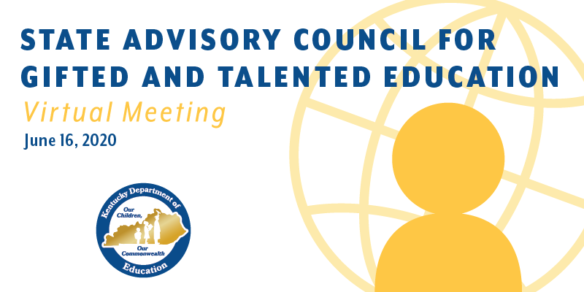
- Julia Roberts, council chair and executive director of The Center for Gifted Studies, expressed concern with how many gifted and talented students “haven’t thrived with NTI.”
- Joe Percefull, assistant principal at Oldham County High School, said his school already has begun planning for how they will address the issue of potential knowledge gaps in the fall.
By Jacob Perkins
Jacob.perkins@education.ky.gov
The Kentucky Department of Education’s (KDE) State Advisory Council for Gifted and Talented Education met virtually on June 16 to discuss the transition from traditional instruction to non-traditional instruction (NTI) for Kentucky’s gifted and talented students.
Julia Roberts, council chair and executive director of The Center for Gifted Studies, expressed concern with how many gifted and talented students “haven’t thrived with NTI.”
“For many of our gifted kids, there was really no new content, limited content, almost nothing to challenge them to think at high levels,” she said. “If we have to pivot back in that direction again, there is a huge gap in learning for many students – including those who could learn at the fastest pace and the most complex levels.”
Many of Kentucky’s school districts have sent out surveys to their families to gauge their opinions on returning to school in the fall. According to Interim Education Commissioner Kevin C. Brown, some families have said that even if there were a traditional opening, they still would not be comfortable sending their students into the school building.
“Districts, of course – and they should be doing this – are planning to try to deliver NTI virtual instruction to those students while the student’s classmates will be sitting in a classroom,” said Brown. “So that’s adding another level of complexity to it.”
KDE released guidance on June 15 on considerations for schools should intermittent closures be necessary during the 2020-2021 school year due to the COVID-19 pandemic.
The document encourages districts to plan for potential intermittent closures and provides elements for school readiness, including online instructional design and the use of school technology. It also provides several considerations for districts based on the length of a closure.
Joe Percefull, assistant principal at Oldham County High School, encouraged KDE to include current teachers when the department is developing these guidance documents. He said that since teachers have now lived through NTI for several months, they will be able to inform education leaders about what will and what will not work with NTI.
Recently, KDE invited teachers to respond to a teacher survey as a way for the department to better understand how to support educators across Kentucky. The survey will provide KDE with information on teacher wellness, supporting students experiencing trauma, implementing distance learning and assessing students’ knowledge when schools reopen.
KDE also has released surveys for superintendents, principals and families. The family survey is available in both English and Spanish.
Office of Teaching and Learning Reopening Guidance
Krista Hall, director of KDE’s Division of Program Standards, and Misty Higgins, professional learning coordinator from KDE’s Office of Teaching and Learning (OTL), joined the council to discuss KDE’s recent webcast series designed to provide guidance for schools and educators on how to support students when in-person classes resume.
The purpose of Stage One of the OTL reopening guidance is for the grade-level or course content team to analyze the content actually taught during 2019-2020 to make adjustments to the 2020-2021 curriculum to address knowledge gaps for incoming students due to extended remote learning resulting from the COVID-19 emergency.
“There may be a lot of unknowns, but the purpose of the guidance that we created was regardless of which situation in which we may start school, teachers still need to have a curriculum in place in order to start that school year,” said Higgins.
KDE previously recommended that districts consider three possibilities for when the next school year might start:
- An early start, perhaps as early as late July;
- A traditional start; and
- A late start, perhaps after Labor Day.
Brown told superintendents during the June 9 Special Superintendents’ Webcast that he feels districts can begin to look at starting in a traditional time frame or a late start – assuming the guidance that will be released from the Kentucky Department for Public Health is followed. However, districts should be prepared to switch to non-traditional instruction (NTI) if need be.
Higgins said “the curriculum itself will not as likely be impacted by the way in which we may start school.”
Percefull said his school already has begun planning for how they will address the issue of potential knowledge gaps in the fall.
“We’ve even talked about going back and looking at models where our kids return to their schedules from last year,” he said.
The plan, according to Percefull, would be to have the school’s senior-level teachers teach the incoming freshmen for a couple of weeks while sophomores, juniors and seniors return to their teachers from last year.
“That’s going to be the mess for us to figure out how to get those kids to the right level,” he said.
OTL recommends in their guidance to have vertical conversations between grade levels to prepare for these potential gaps.
The work done in Stage One of OTL’s reopening guidance will feed into the Stage Two guidance that will be released in July.
“Stage Two is all about formative assessments and evidence-based practices that really help us to meet the needs of all the learners that may be sitting in our classroom,” said Higgins.
The next State Advisory Council for Gifted and Talented Education meeting is Aug. 27.
Office of Teaching and Learning Stage One Webcast Series:
- “Preparing for Re-entry: Addressing Knowledge Gaps”
- “Preparing for Re-entry: Addressing Knowledge Gaps (Part 2)”
- “Preparing for Re-Entry: Addressing Knowledge Gaps (Part 3)”
For more information about COVID-19:
- Kentucky Department for Public Health’s COVID-19 webpage
- KDE’s COVID-19 webpage
- COVID-19 Hotline (800) 722-5725




Leave A Comment